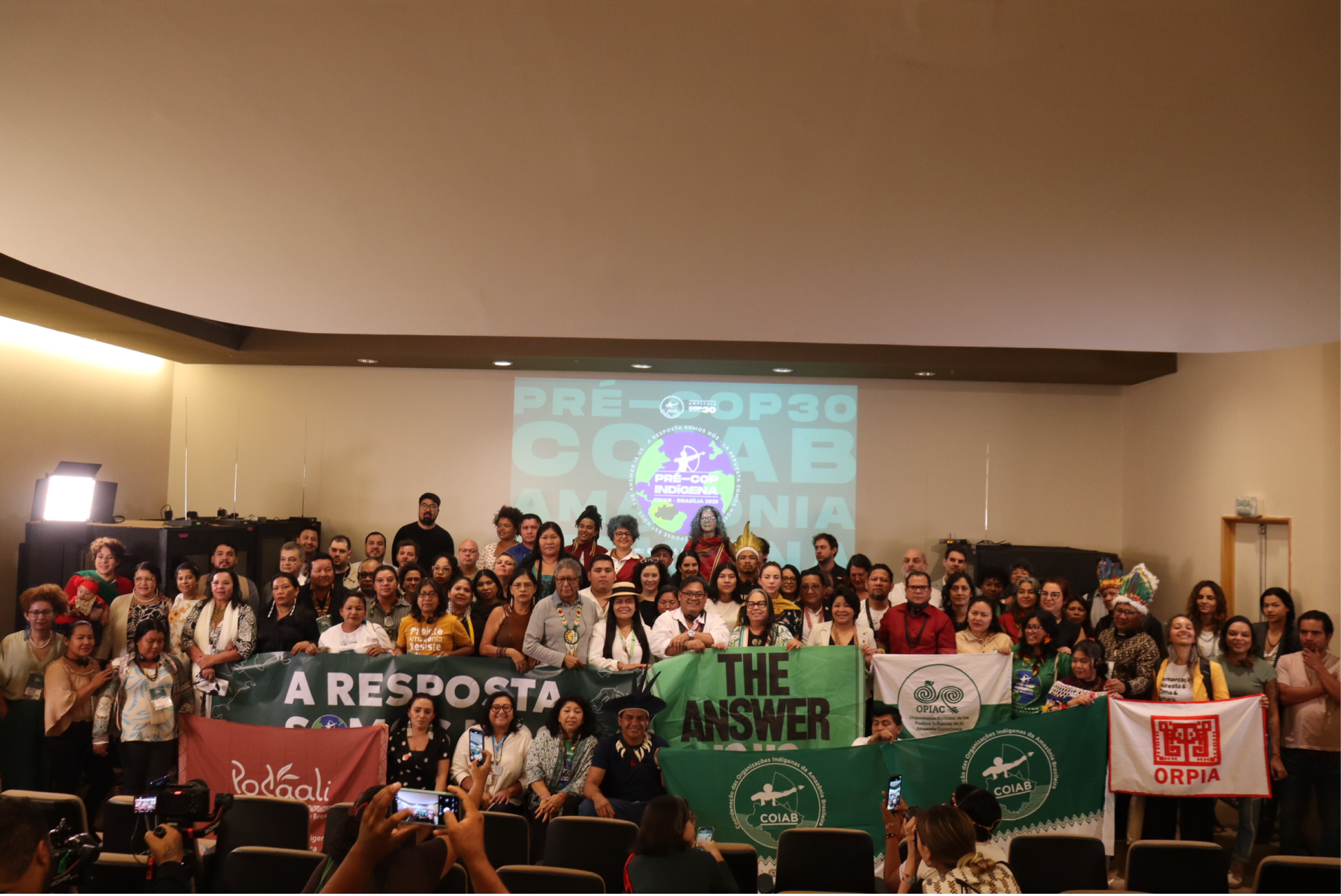June 17, 2025
by: Paula Alvarado
As delegates gather in Bonn for the UN’s mid-year climate negotiations, a powerful
political statement is making its way from the heart of the Amazon to the corridors of global climate diplomacy. On June 5, Indigenous leaders from across the nine
Amazonian countries and all biomes of Brazil issued a historic Political Declaration
during the Indigenous Pre-COP Summit in Brasília. This declaration is more than a
call for inclusion—it is a comprehensive mandate for climate justice, rooted in
territory, rights, and ancestral knowledge.
The timing is deliberate. The Bonn Climate Change Conference – June 16th to 26th –
is the last major milestone before COP30, which will be hosted in Belém do Pará,
inside the Amazon. For the first time, the world’s premier climate summit will take
place within a biome that is not only globally strategic, but deeply contested. It is also a home: to more than 500 Indigenous Peoples, 188 of whom live in isolation. The forest is not a backdrop to their lives—it is an extension of them. And as they remind the world in their declaration, “If the Amazon falls, the planet collapses.”
The Pré-COP Indígena was not a side event. It was a declaration of sovereignty.
Held in Brasília from June 2–5, it brought together dozens of Indigenous
organizations—COIAB, APIB, organizations from the 9 countries of the Amazon
Basin, regional federations, and women’s and youth movements. Their message to
COP30 and the international community was clear: Indigenous Peoples are not
participants. They are the hosts.
The declaration they launched is grounded in six central priorities. First, the full
recognition and protection of Indigenous territories—not only as a matter of human
rights, but as a frontline climate strategy. These territories, especially those inhabited by Peoples in Isolation and Initial Contact (PIACI), are vital carbon sinks and biodiversity sanctuaries, and must be protected from any form of extractive activity. Second, the demand for direct financing and financial autonomy. Climate finance must reach Indigenous communities through mechanisms under their own governance, not be filtered through state structures that often fail to protect their rights.
Third, the declaration calls for full, effective, inclusive, and gender-responsive
participation of Indigenous Peoples in all climate decision-making spaces, including formal negotiation processes at the UNFCCC. Fourth, it insists on the protection of environmental defenders—leaders who continue to be persecuted, criminalized, and murdered for defending forests and rivers. Fifth, the declaration asserts that Indigenous knowledge systems are not symbolic contributions to climate solutions—they are essential. Their ways of knowing must be integrated into climate policy as legitimate systems of science and governance. Finally, Indigenous territories must be declared zones free of extractive activity. Without this guarantee, none of the other priorities can be meaningfully implemented.
But the declaration does not stop at principles. It goes further—offering a detailed set of demands, each directed at specific audiences. To the Parties of the UN Framework Convention on Climate Change, the declaration demands that the
protection of Indigenous territories be formally recognized in the COP30 Action Document as a critical strategy for mitigation and adaptation. It calls for Indigenous territories—especially those of PIACI—to be recognized as exclusion zones, where fossil fuel, mineral, and biofuel extraction are prohibited. It also demands that
Indigenous governance systems be included in national and global climate planning, including the Global Goal on Adaptation and Article 6 implementation.
Another urgent demand is that the UNFCCC’s financial mechanisms—such as the
Loss and Damage Fund, Adaptation Fund, and Green Climate Fund—create direct
access pathways for Indigenous Peoples, under their own governance. In addition, the declaration calls for the full participation of Indigenous Peoples in the governance bodies of those funds, and in all formal UNFCCC structures, including COP delegations, technical working groups, and subsidiary bodies.
The declaration also addresses the Amazon Cooperation Treaty Organization (ACTO), urging it to formally submit the Indigenous declaration to COP30 and to operationalize existing commitments, including the establishment of an Amazonian Mechanism for Indigenous Peoples and an Observatory for the Protection of Indigenous and Environmental Defenders. Importantly, it calls for the entire Amazon to be declared an extraction-free zone as a strategic measure for the energy transition.
To the governments of the nine Amazonian countries, the message is equally direct:
incorporate Indigenous knowledge systems and Life Plans into national climate
policies, legally secure and demarcate all Indigenous territories, especially those of
PIACI, and ensure Indigenous representation in all national climate governance
structures. Financial access mechanisms at the national level must also be
developed, with differentiated criteria aligned with Indigenous realities.
This is not a vision of protest. It is a proposal for governance.
And that is why the declaration is being presented in Bonn. As technical discussions
continue on the Global Goal on Adaptation, Article 6, and Loss and Damage,
Indigenous leaders are insisting that their proposals be reflected now—before the
negotiations move to Belém. The world must stop treating Indigenous Peoples as
stakeholders and start recognizing them as co-authors of climate governance.
The declaration ends with a statement that captures the urgency of this political
moment: “The climate crisis has causes, names and those responsible. And it will
not be us, Indigenous Peoples of the Amazon and the other biomes of Brazil, who
will bear this burden alone.” And then the final line, which reverberates like a
drumbeat: “For the climate and the Amazon — the answer is us.”
Bonn will be a test. COP30 even more so. The forest has spoken. The question now
is whether the world is truly listening.
